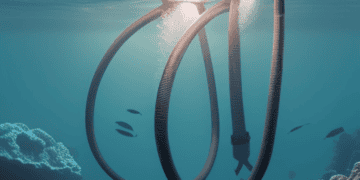DUBAI, United Arab Emirates — Officials reported on March 4 that three underwater cables in the Red Sea, vital for global internet and telecommunications, have been severed. This incident occurs as the region faces ongoing disruptions attributed to the conflict involving Yemen’s Houthi rebels. Additionally, a Houthi missile attack recently targeted a ship in the Gulf of Aden, causing a fire but no injuries. HGC Global Communications, based in Hong Kong, confirmed the damage to the cables but did not specify the cause. The disruption has raised concerns about potential targeting by the Houthis, amidst their campaign to influence Israel’s military actions in Gaza. However, the Houthis have denied involvement in damaging the cables.
The cut cables include significant routes such as Asia-Africa-Europe 1, Europe India Gateway, and Seacom-TGN-Gulf, impacting approximately 25% of traffic through the Red Sea. This route is crucial for data transmission between Asia and Europe. Efforts to reroute the affected traffic are underway. HGC clarified that the Seacom-TGN-Gulf cable was mistaken as two separate lines in the area of damage. Seacom has indicated that the damage occurred within Yemeni maritime jurisdictions in the Southern Red Sea and is working on traffic rerouting, though some services remain affected. Tata Communications, associated with the Seacom-TGN-Gulf line, has taken immediate actions to mitigate the impact of the cut.
The incident follows allegations by Yemen’s internationally recognized government in exile that the Houthis planned to target the cables, with evidence of disruptions emerging in late February. Internet access disruptions were notably observed in Djibouti, served by Seacom. In response to the cable damage, the Houthis accused British and U.S. naval military operations of causing the disruptions, although they provided no evidence to support their claims. The Red Sea has seen repeated targeting of vessels amid the Israel-Hamas conflict, with Houthi attacks extending to ships with ties to their supporters and humanitarian aid shipments.
Despite ongoing U.S.-led airstrikes, Houthi capabilities for significant attacks remain intact, including a recent incident involving the sinking of the cargo ship Rubymar. Houthi military spokesperson Brig. Gen. Yahya Saree has claimed responsibility for recent attacks, emphasizing their intent to disrupt Israeli-affiliated shipping until conditions in Gaza improve. The exact means by which the underwater cables were cut remains uncertain, as the Houthis lack known capabilities for such underwater operations. However, anchor dragging by ships, particularly those affected by attacks, is a possible cause of the cable damage. The Red Sea hosts 14 operational cables, with additional routes planned, underscoring its importance for global communications between Europe and Asia. Despite the current challenges, the telecom industry’s redundancy measures have helped maintain connectivity.
Explore the newest supply chain news at The Supply Chain Report. Visit ADAMftd.com for free international trade tools.
#TelecomNews #RegionalTensions #GlobalTelecoms #RedSeaCableCutNews #InfrastructureNews















